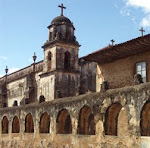An inveterate traveler posted this on a message board that I happened upon:

To me, Patzcuaro is a VERY SPECIAL, enchanting place. When you enter the city, you can imagine that you’ve gone back 200 years in time. Of course, there are automobiles, electricity, and other modern conveniences, but the basic aura of the city is timeless. It exudes feelings of a simpler time when people spent time together and engaged in ages old occupations ~ farming, fishing, weaving, and hand-crafting items for use in every day life. I’ve NEVER seen any city that has a bulk SEED STORE located on their main plaza. Apparently it’s been there forever and ever, and has been run by the same man for generations. In Patzcuaro, you still see MANY Tarascan people in their traditional clothing out and about.
Patzcuaro is a place we WILL return to ~ hopefully over and over again…
Post by JoanieBlon of maison-t-bayou.com/ to www.zihuatanejo-ixtapa.com.mx/wwwboard/messages/181505.html



3 comments:
Unless I´ve been sleepwalking, and it´s quite possible, the bulk seed store is rather recent. And, alas, the owner tosses seed out on the sidewalk in the morning, encouraging the urban plague called pigeons to hang around. This is very bad.
You might also note that the "Tarascan Indians" Are really P'urhépecha's. Calling them Tararscan is like calling a black person " That nice clored fella".
Yes, although this visitor liked Patzcuaro, she did use the common misnomer Tarascan rather than the correct name, Purhépecha. It is telling that the indigenous people speak Purhépecha. Tarascan is commonly (mis)used even by many Mexicans. The brutal Spanish conquistadores took indigenous women and consequently the Purhépecha sometimes referred to the men as "tarascue", meaning something akin to inlaw--rather benevolent under the circumstances. The Spanish misunderstood and thought that the word referred to the Purhépecha themselves, hence the erroneous appellation "tarascos".
Post a Comment